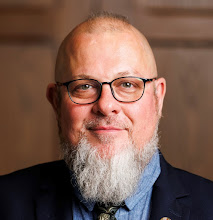 |
| Participants at the Gunning Library Workshop, Friday 30 September 2016. Photo courtesy of Maree Roche |
The Gunning and District Historical Society, in conjunction with the Gunning Library, held its second community workshop on Friday 30 September 2016. The topic was "Researching Australian Military Service Records" facilitated by Gunning resident Dr Michael de Percy from the University of Canberra.
Information and paraphernalia provided by the National Library of Australia's Trove team and also the Research Centre at the Australian War Memorial were welcomed by the participants, many traveling from as far as Ulladulla, Canberra, Mt Pleasant and Breadalbane to visit the village.
Two sessions were held from 10:30am to 12:30pm and from 1:30pm to 3:30pm. Participants enjoyed morning and afternoon tea during the sessions, allowing time for new connections to be made and to share stories and ideas about researching family histories.
The workshop covered the basics of researching the information available from the Australian War Memorial, Trove, the National Archives of Australia, and ancestry.com.au (which can be accessed for free from the Gunning Library), with some venturing into the births, deaths and marriages websites for NSW and Victoria.
Some of the participants were able to discover digitised war records of various family members. This is much easier for those who served in the Australian Imperial Force in the First World War and the 2nd Australian Imperial Force in the Second World War. But it can be particularly challenging to find information on those who served in the Citizen Military Forces (CMF) or in the Royal Australian Navy.
The Australian Army website provides more information about searching records from various conflicts, and online access to the records from the Royal Australian Navy are still somewhat limited but improving over time.
Some of the participants discovered various records of family members who were Prisoners of War or Indigenous servicemen. Others worked patiently and were rewarded by discovering their family members under slightly different names (for example, one "James" was officially "Jim" in the records), while others were able to find new information such as newspaper articles on Trove about the exploits of their relatives some time after the war.
Some of the more difficult to find records appear on the Australian Government's World War Two Roll website, which is currently being updated to a new website managed by the Department of Veterans' Affairs.
One participant was able to complete an assignment for school based on the service records and was very helpful in assisting other members of the group to grapple with some of the more technical issues that inevitably arise when using technology!
Others will have to request a copy of their relative's records, but were able to register to request this information either for purchase or physical viewing from the National Archives in Canberra.
Overall, participants reported that the event was a success, with many wishing that the sessions were longer. Ideas for future sessions included a session on researching family history and creating a blog for use by individuals and community groups.
The Gunning and District Historical Society plans to run one of these free community sessions each quarter. Details of the next workshop will be advertised in the Lions Club of Gunning Noticeboard, on the Gunning Community Announcements and Events Facebook page, and on this blog.
If you have any other ideas for community workshops using the computers at the Gunning Library, please contact Dr Michael de Percy at: michael.depercy@canberra.edu.au.
 Donate
Donate







 The Political Flâneur: A Different Point of View
The Political Flâneur: A Different Point of View